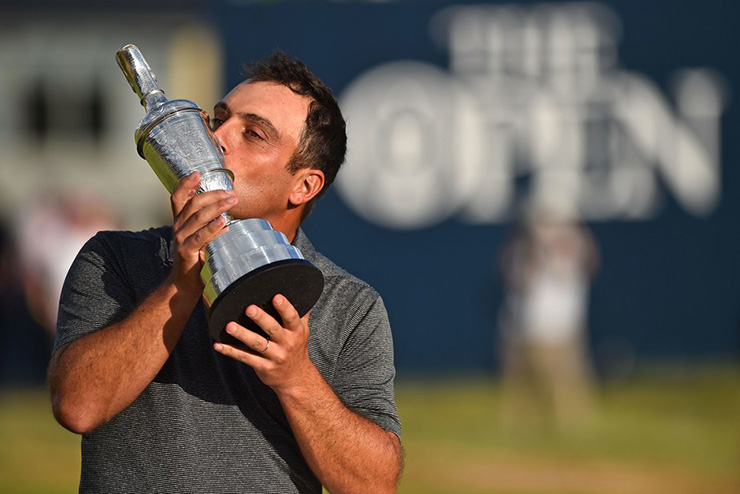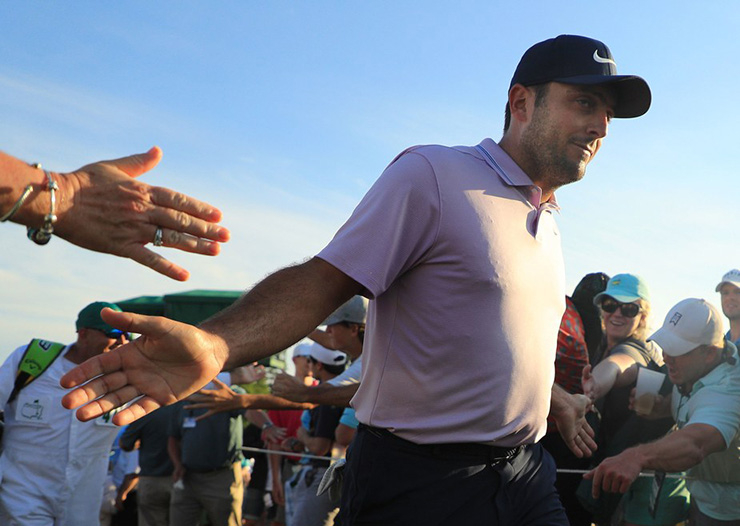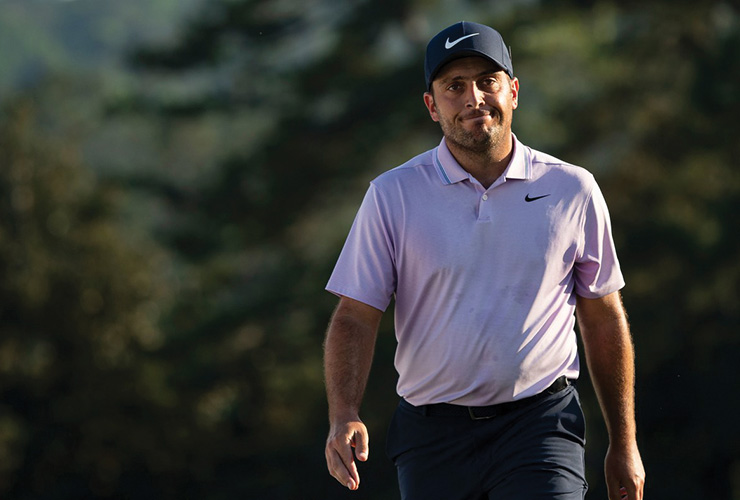By John Huggan
Many of the third-round headlines at this 83rd Masters will surely and justifiably feature the words “Tiger” and “Woods,” but the man everyone will have to catch on the final day owns perhaps the last hand Woods would want to shake on the first tee at Augusta National. For the last nine months or so, Francesco Molinari has trumped almost every positive move the 14-time major champion has made.
• Last July, it was Woods, as tournament host, who presented the winner’s trophy to the 36-year-old Italian after his runaway eight-shot victory at the Quicken Loans National outside Washington, D.C., Molinari’s maiden PGA Tour triumph.
• Two weeks later, the pair played alongside each other in the final round of the Open Championship at Carnoustie. Woods had chances, but it was Molinari who lifted the claret jug.
• Roughly two months later, they were together again (and again and again), as opponents during the Ryder Cup at Le Golf National. Molinari received congratulations from Woods at the end of all three matches.
And now they are going at it again, with Molinari, on 13 under par, carrying a two-shot edge over Woods heading into Sunday’s fourth round.

Glyn Kirk/AFP/Getty Images
All of which is a long way from the time, at the 2006 Masters, when the now familiar duo met for the first time. Back then, Molinari was dressed in a white jumpsuit and on the bag for his older brother, Edoardo, the 2005 U.S. Amateur champion, who was playing alongside the defending champion the first two days.
Four years after that, Woods dusted the younger Molinari, 4 and 3, in the final-day singles at the 2010 Ryder Cup. That match was repeated in 2012 at Medinah, the pair finishing all square. The tide was already turning.
All of which is evidence enough of how Molinari has improved. Lest we forget, as well as becoming the “champion golfer of the year” for 2018, he won the BMW PGA Championship at Wentworth, the biggest event on the European Tour, and went 5-0 at the Ryder Cup, four of those wins in cahoots with his close pal, Tommy Fleetwood.
“The Open victory was the end result of so much hard work by Francesco on all departments of his game,” says Molinari’s long-time swing coach, Englishman Denis Pugh. “The three parts—swing, short game and performance—have really gelled together.
“He had played poorly at the Players Championship in May last year. So poorly that we pretty much went back to basics. And it worked. After the win at the BMW PGA at Wentworth, he just went on and on and on. Francesco plays his best when he is thinking about his swing. He gets good feelings from his mechanics. So we haven’t worked on anything new. With him, it is just a case of going over and over the old stuff. That’s not very sexy, but it works.”
It is, however, on the greens—long the aspect of the game that let him down—where Molinari has been transformed most.
“I feel a lot more confident about hitting the middle of the putter-face,” he said, after saving par from the front bunker on the 18th. “The ball starts on line more often, which makes reading the greens easier. I was patient on the front nine today. I made a couple of really big putts to save par on four and five. And I played the back nine as well as I ever have.”

Molinari high-fives patrons as he walks off the 18th green during Saturday’s third round. (Mike Ehrmann/Getty Images)
Sound putting was also the cornerstone of his Open victory. A lowly 74th in fairways hit and only 23rd in greens in regulation, Molinari was fourth in total putts at Carnoustie. As Pugh is quick to acknowledge, his charge has been helped enormously by putting coach Phil Kenyon and performance guru, Dave Alred.
“Dave has made Francesco a lot more specific in his targets and given him what he calls ‘an ugly short game,’ ” Pugh said. “There have been times when it felt like he would almost have to hit every iron to two feet in order to make birdie. So it’s been a long process. A grind at times. Which is typical of Francesco. In terms of intensity, he is the hardest worker I have ever seen. He doesn’t necessarily work long hours. But when he is working it is always 100 per cent effort and concentration.”
All of the above has gone into what has been, so far, an almost error-free performance for the man who now calls London home. On this form, he is going to be enormously difficult to beat. Only once, courtesy of a rare errant approach shot that found the water on the 11th hole in the opening round, has he dropped a shot to par. And, perhaps even more portentously, Molinari is only the fifth golfer to shoot one round of 66 or better and another of 67 or better in the middle two rounds of a Masters. All four of his predecessors—Ian Woosnam in 1991, Woods in 1997 and 2005 and Patrick Reed last year—went on to win.
“Tiger and I do seem to keep meeting each other,” joked Molinari, who speaks Spanish to his caddie, Italian to his wife and English to his coaches. “It is always nice to play with him and in the last group of a major. I’ll just do my thing as always. I’ll give it my best. That’s all I can do. But I feel ready.
“Meeting Denis has been perhaps the biggest turning point in my career. He has had the most influence on my game. But he was also smart enough to involve other people who have helped me in other areas. Dave has made a huge difference to me over the last three years. It is not really my personality to be in the spotlight. We had to work on that. But we found a way to make me better under pressure. I’m a lot more resilient.”
Actually, he’s a lot more everything. Good luck catching him Tiger.









